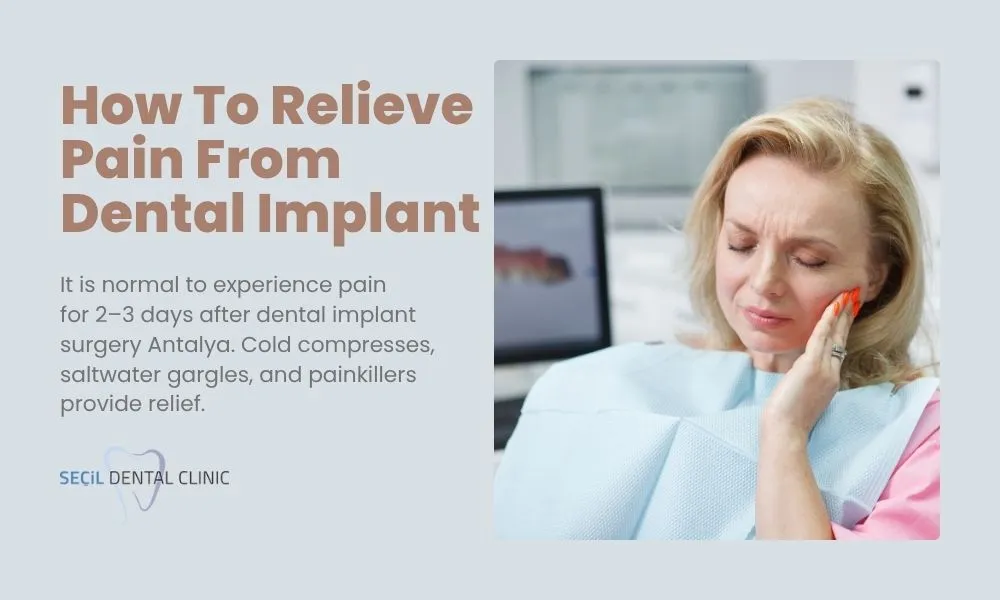CONTENTS
It is normal to experience pain, pressure, or slight swelling for a few days after dental implant surgery. Following the procedure, the jawbone and gums attempt to adapt to the implants. This natural process is felt as pain on the first day but gradually turns into discomfort. In other words, the pain subsides and disappears within a week at most.

We have explained how to alleviate the pain associated with dental implants, which is a natural process.
Applying a cold compress to your cheek within the first 24–48 hours after dental implant surgery in Antalya will reduce pain and swelling. Apply an ice pack or frozen vegetables wrapped in a cloth to your face for 5 minutes, then take a 5-minute break. When doing this, wrap the ice in a cloth and do not apply it directly to your face. This method helps control swelling in the area and alleviates implant pain.
Add half a teaspoon of salt to a glass of warm water, swish the mixture around your mouth for about 30 seconds, and spit it out. While doing this, you should gently swish your mouth and spit. It is not recommended to spit during the first 24 hours, so start gargling on the second day. Gargling with saltwater keeps the implant area clean, reduces bacteria, and soothes gum sensitivity.
You can use the painkillers recommended by your dentist to manage the pain. Your dentist will provide medication to reduce both the pain and inflammation. Use these medications strictly according to the instructions. However, if the pain is throbbing or progressively worsening, there may be inflammation or nerve pressure around the implant. In this case, it is important to consult your dentist for early intervention.
The surgical site will be sensitive for the first few days. Therefore, soft and warm foods such as yoghurt, purées, warm soups, omelettes, and smoothies should be preferred. Hard, crunchy, or sticky foods put pressure on the gums, increasing pain and causing the implant to shift. Avoid these foods until dental implant site has healed.
Paying attention to oral hygiene reduces the risk of infection and helps the pain subside quickly. Use a soft-bristled toothbrush and avoid direct contact with the surgical area for the first few days. You can then gently clean the surrounding teeth. >Do not use an electric toothbrush or water flosser until healing is complete. Such devices may cause bleeding or irritation in the early stages.
Most patients experience mild pain after dental implants, and this pain gradually subsides each day. However, in some patients, this process does not occur due to reasons such as infection. If you experience pain that intensifies day by day, be sure to contact your dentist. There is no cause for concern, but if an infection develops, you may need to take antibiotics.
The reason you may experience pain after your dental implant treatment is sometimes simply due to pressure from your crown. This can be corrected with a minor procedure quickly.
Persistent pain usually indicates inflammation of the gums. It is treated with antibiotics. Early intervention protects the gum tissue and the bone surrounding the implant.
First and foremost, it is crucial to select an experienced implant dentist. Modern surgical techniques and high-quality implant materials ensure faster recovery and greater success.
Additionally, you must follow all your dentist's instructions. You should take your medication regularly, follow a soft diet, and observe hygiene rules.Attending check-ups on time allows any problems to be detected early and resolved immediately.
Avoiding smoking for at least 2 days, ideally 7 days, protects implant. Ensuring oral care and hygiene also prevents implant pain associated with potential complications.
Make An Appointment Today With Our Online Form